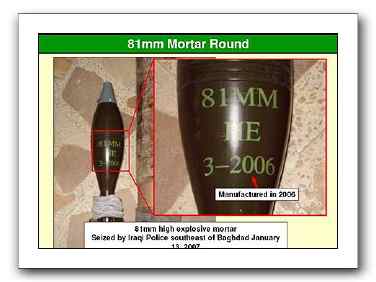When I Hear "Precise Machining," Iran Springs to Mind
 The New York Times has an article “U.S. Presents Evidence of Iranian Weapons in Iraq.” It contains this gem:
The New York Times has an article “U.S. Presents Evidence of Iranian Weapons in Iraq.” It contains this gem:
They said that at least one shipment of E.F.P.’s was captured as it was being smuggled across the border from Iran into southern Iraq in 2005. The precise machining, the officials said, is another feature that links the weapons to Iran. “We have no evidence that this has ever been done in Iraq,” a senior United States military official said.
Let’s examine that. First, Iran is not known for its exports of precise machinery, the way, say, Germany, Switzerland, or Sweden are. Second, even if Iran were known for precision machining, so are other countries. The fact that precision machine work was done may demonstrate that, say, Syria wasn’t involved. It doesn’t demonstrate that Iran was involved. Finally, the absence of evidence is not evidence of absence. Iraq has long had strong weapons engineering. The country is clearly in anarchy. The fact that the US hasn’t found evidence of something in Iraq is non-evidentiary.
The BBC has pictures they attribute to the US briefing. Do the Iranians use European numbers on their munitions? (European numbers are often called Arabic numerals, but that’s a reference to the 0-9 and places, not the typographic symbols used. See the Wikipedia entry on Arabic numbers, which shows a distinct “Eastern Arabic-Indic” numbering system, subtitled “Persian and Urdu.”) Which means that the numbers from Iran should perhaps read “٨١mm,” and “٣-٢٠٠٦” respectively.
Scaling away from the details, two other points I’d like to make. First, I understand that Iran has been engaging in military action against the United States since the inception of the state, the kidnapping of US diplomats, to the Marine barraks bombing on through today. I think that we need a strategic response to Iranian belligerence. That no more means war than a strategic response to the Soviet Union meant war. Furhter, our conduct of the war in Iraq puts a high bar on thinking through what our response would entail and how it would result in better liklihood of a better outcome. However-and here’s the second point-the utterly shoddy job done by US intelligence before the current mess in Iraq means that US intelligence must be held to a higher standard, and what’s presented, at least as relayed by the New York Times, passes for prejudice and sloppy thinking, not intelligence work.
I don’t think the machining required for creating EFPs is likely out of the reach of any country. Especially, it is the machine tools themselves which are hard and expensive, but the use of those tools isn’t so much of an issue. On the whole, whether Iran *export* or evidences such seems to be a bad argument. If they’re busy on nukes, then they can do mortar rounds.
Also, I wouldn’t be surprised if the lettering on mortar rounds is in English. Military equipment in the small-arms category operates to the same sorts of interoperability rules as software, so the books, instructions, procedures and so forth all have an influence on standards; most armies seems to have standardised on 81mm mortars for example.
I think it is likely that the US will be able to prove Iran is supplying arms … but still no-one will believe them 🙂
Perhaps you’re expecting a level of proof or evidence that is unrealistic. Given 1) Iran’s past terroristic activities, 2) its current rhetoric and belligerence, 3) its capability of delivering on at least some of its threats, and 4) at least reasonable connections to Iran (not just weapons smuggling, but a Qud officer in Erbil), the conclusions that Iran is involved somehow seems obvious. What to do about it is the real question.
That a holocaust denier denies involvement in Iraq almost persuades me of the opposite by itself.